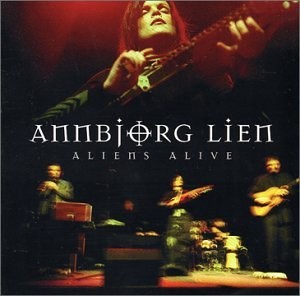 Asher Black penned this review.
Asher Black penned this review.
Behind every traditional hardanger fiddle tune there is always a story, always a fairy tale, and you actually tell the stories when you play the fiddle. — Annbjørg Lien
For those who don’t know, Lien is Norwegian, from Sunnmore; cites Emerson, Lake, and Palmer as a primary influence; and is fluent in the idioms of jazz, folk, new-age, and progressive rock. She’s been a hardanger fiddle player from six years of age, playing concerts abroad since her teens (Italy at 14), and released four albums in the eighties before finding international fame in the nineties. She also plays nyckelharpa and violin, and has an orchestral background with folk and classical training.
Note: A hardanger fiddle (hardingfele) is smaller than a violin, has a flatter fingerboard so that playing multiple strings throughout a piece is the norm, and has sympathetic steel strings beneath the top strings that resonate when certain top notes are struck, yielding a kind of reverberation when tuned, as it usually is, to notes prominent in a particular piece. It’s an exclusively Norwegian instrument, usually quite baroque in ornamentation — like the mediaeval viole. The fractally ‘harmonics’ are also most pronounced at close range.
Annbjørg is a consummate collaborator, working on projects ranging from being an official Olympic Musician to an appearance on an album by The Chieftains. She seems to have even taken the stage with Deep Purple on their Concerto Tour 2000. One of the most interesting projects in which I’ve encountered her is The Man from God Knows Where. Do listen, as the audio is magnificent.
Though with its range and subtleties the hardanger is a solo instrument, on Aliens Alive, Lien places it in an electric/acoustic band setting, with sophisticated arrangements that allow the instrument to really shine. Even Jew’s harp and bagpipe lend to the instrumental theatrics of this disc.
This is a CD for fans: live cuts from the 2001 Norwegian tour, all of her other albums are represented, and there’s even some new material. Though Lien’s hardanger is the centerpiece, the band’s sonic integrity is due in part to including Väsen guitarist Roger Tallrothm, Norwegian guitar virtuoso Rolf Kristensen, keyboardist Bjørn Ole Rasch (of Bukkene Bruse), Hans Fredrik Jacobsen providing wind, and Rune Arnesen and Per Hillestad driving percussion. She is also joined by Bjorn Ole Rasch – keyboards, mini-moog and programming, Rune Arnesen – percussion, Hans Fredrik Jacobsen – flutes, bagpipes, clarinet and oud, and Roger Tallroth – guitar.
“The Rose” (a traditional tune arranged by Lien) opens with a mournful, wasting hardanger, unaccompanied, that seems to feed on the ambience and wither with aching beauty into the next track. It was great to hear “Loki” again from her previous album Baba Yaga. The ethereal new-age quality of its beginning is made hot with percussion and chant and given over still warm to the keyed fiddle, pulled back and forth between fiddle and flute. Parts of it reminded me of Enya’s “Deireadh an Tuath” until it was pleasingly bloody with oozing mini-moog. Or was it throat-song? Hard to tell.
“Origins” is a medley of Nordic musical styles including a wonderful Troll (Yoik) , Ailo Gaup, in the part called Oainnahus (“vision”). A version of “Oainnahus” also appears on Baba Yaga. “Morning Mood” is a half-minute parody of composer Edvard Grieg’s piece from Peer Gynt. The audience laughs, but I think it’s a poor potshot and really beneath the artists. It bears even less mention than it merits disc time. “Knepphalling” has been hitting playlists in America. It’s Roger Tallroth’s arrangement. I don’t think it would be an insult to liken it to acrobatic Nordic bluegrass. His guitar duet with Lien’s hardanger is almost reminiscent of “Duelling Banjos.”
“Larry Goes Log-Driving,” an adaption from Baba Yaga, is arranged by keyboardist Bjorn Ole Rasch — an audience rousing piece capped off with an almost power-rock enthusiastic ending. “Luseblus” has a promising blues lead-in that provokes the audience which, unfortunately, wounds the track with rhythmic clapping. I suppose this is what I dislike most about live CDs; sometimes they turn into an exercise in call and response, almost as a philosophical obligation of the artist to collaborate with anyone who wants to join in. I think it’s akin to passing out kazoos. Fortunately, it doesn’t last long, and this is another popular one for the station playlists. “Astra” (from Baba Yaga) fits its title (meaning “eternal light”); if Vangelis had fiddles, it would be like this. “Inoque” (also from Baba Yaga) came out of Lien going to Mozambique with Save the Children. I like this version much better than Baba Yaga‘s. There is less tribal singing which, brought in from another live recording, never quite works. That kind of sampling is a thing for the studio rather than a live performance, so the use of it here is properly conservative, just enough to hint at the track’s purpose.
Title track “Aliens Alive” features guitarist Roger Tallroth of Vasen. If Mussorgsky’s is ‘walking music’, this triple procession of vignettes is skipping, running music. The drums are marvelous. Bagpipes, too. It’s the most exciting one on the CD, and the audience virtually chants its applause.
“Fykerud’s Farewell to America” will be familiar to hardanger devotees. Inspiration and hardanger legend Hans Fykerud is memorialized in this solo hardanger track, just as Hans W. Brimi was remembered in “W” from Baba Yaga. Lien is clearly drawing attention to the hardanger as tradition, shoring up a knowledge of its roots.
Even though much of the material is from Baba Yaga, it’s not a repeat of that CD. The variants here are desireable in their own right. Fans will want both albums. This disc, like Baba Yaga, does have that Emerson, Lake, and Palmer flavor, so it’s sure to please both Nordic trad and prog rock fans with nostalgic leanings. It’s as perfect as its predecessor as an introduction to Lien’s work.
(Northside/Grappa Records, 2002)
